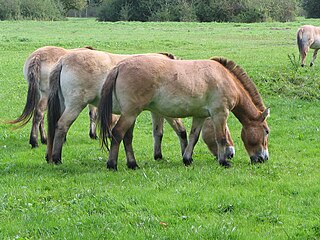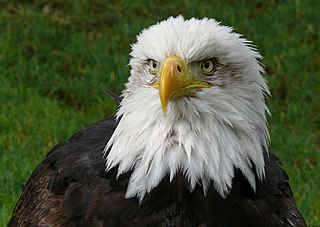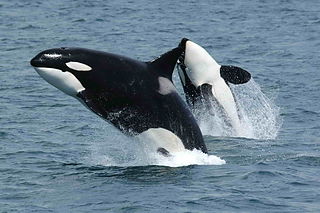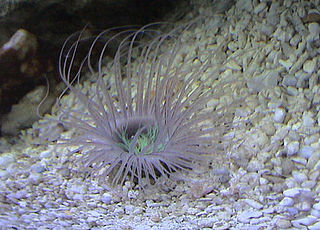
Equidae is the taxonomic family of horses and related animals, including the extant horses, donkeys, and zebras, and many other species known only from fossils. All extant species are in the genus Equus, which originated in North America. Equidae belongs to the order Perissodactyla, which includes the extant tapirs and rhinoceros, and several extinct families.

Weasels are mammals of the genus Mustela of the family Mustelidae. The genus Mustela includes the least weasels, polecats, stoats, ferrets and mink. Members of this genus are small, active predators, with long and slender bodies and short legs. The family Mustelidae, or mustelids, is often referred to as the "weasel family". In the UK, the term "weasel" usually refers to the smallest species, the least weasel (M. nivalis), the smallest carnivoran species.

Eagle is the common name for many large birds of prey of the family Accipitridae. Eagles belong to several groups of genera, some of which are closely related. Most of the 60 species of eagle are from Eurasia and Africa. Outside this area, just 14 species can be found—2 in North America, 9 in Central and South America, and 3 in Australia.
Genus is a taxonomic rank used in the biological classification of living and fossil organisms as well as viruses. In the hierarchy of biological classification, genus comes above species and below family. In binomial nomenclature, the genus name forms the first part of the binomial species name for each species within the genus.

In taxonomy, binomial nomenclature, also called binominal nomenclature or binary nomenclature, is a formal system of naming species of living things by giving each a name composed of two parts, both of which use Latin grammatical forms, although they can be based on words from other languages. Such a name is called a binomial name, a binomen, binominal name or a scientific name; more informally it is also called a Latin name.

The lagomorphs are the members of the taxonomic order Lagomorpha, of which there are two living families: the Leporidae and the Ochotonidae (pikas). The name of the order is derived from the Ancient Greek lagos + morphē. There are 110 recent species of lagomorph of which 109 are extant, including 34 species of pika, 42 species of rabbit, and 33 species of hare; the one recently extinct species is the Sardinian pika, which was the last surviving member of its family Prolagidae.

The opossum is a marsupial of the order Didelphimorphia endemic to the Americas. The largest order of marsupials in the Western Hemisphere, it comprises 110+ species in 19 genera. Opossums originated in South America and entered North America in the Great American Interchange following the connection of the two continents. Their unspecialized biology, flexible diet, and reproductive habits make them successful colonizers and survivors in diverse locations and conditions.

The biological subfamily Bovinae includes a diverse group of 10 genera of medium to large-sized ungulates, including domestic cattle, bison, African buffalo, the water buffalo, and the four-horned and spiral-horned antelopes. The evolutionary relationship between the members of the group is still debated, and their classification into loose tribes rather than formal subgroups reflects this uncertainty. General characteristics include cloven hooves and usually at least one of the sexes of a species having true horns. The largest extant bovine is the gaur.

Anseriformes is an order of birds that comprise about 180 living species in three families: Anhimidae, Anseranatidae, and Anatidae, the largest family, which includes over 170 species of waterfowl, among them the ducks, geese, and swans. Most modern species in the order are highly adapted for an aquatic existence at the water surface. With the exception of screamers, males have penises, a trait that has been lost in the Neoaves. Due to their aquatic nature, most species are web-footed.

Starlings are small to medium-sized passerine birds in the family Sturnidae. The name "Sturnidae" comes from the Latin word for starling, sturnus. Many Asian species, particularly the larger ones, are called mynas, and many African species are known as glossy starlings because of their iridescent plumage. Starlings are native to Europe, Asia and Africa, as well as northern Australia and the islands of the tropical Pacific. Several European and Asian species have been introduced to these areas as well as North America, Hawaii and New Zealand, where they generally compete for habitats with native birds and are considered to be invasive species. The starling species familiar to most people in Europe and North America is the common starling, and throughout much of Asia and the Pacific, the common myna is indeed common.

The herons are long-legged, long-necked, freshwater and coastal birds in the family Ardeidae, with 64 recognised species, some of which are referred to as egrets or bitterns rather than herons. Members of the genera Botaurus and Ixobrychus are referred to as bitterns, and, together with the zigzag heron, or zigzag bittern, in the monotypic genus Zebrilus, form a monophyletic group within the Ardeidae. Egrets do not form a biologically distinct group from herons, and tend to be named differently because they are mainly white or have decorative plumes in breeding plumage. Herons, by evolutionary adaptation, have long beaks.

Suidae is a family of artiodactyl mammals which are commonly called pigs, hogs, or boars. In addition to numerous fossil species, 18 extant species are currently recognized, classified into between four and eight genera. Within this family, the genus Sus includes the domestic pig, Sus scrofa domesticus or Sus domesticus, and many species of wild pig from Europe to the Pacific. Other genera include babirusas and warthogs. All suids, or swine, are native to the Old World, ranging from Asia to Europe and Africa.
In biology, a monotypic taxon is a taxonomic group (taxon) that contains only one immediately subordinate taxon.

In zoological nomenclature, a type species is the species name with which the name of a genus or subgenus is considered to be permanently taxonomically associated, i.e., the species that contains the biological type specimen(s). A similar concept is used for suprageneric groups and called a type genus.

The Pterophoridae or plume moths are a family of Lepidoptera with unusually modified wings. Though they belong to the Apoditrysia like the larger moths and the butterflies, unlike these they are tiny and were formerly included among the assemblage called "microlepidoptera".

Tube-dwelling anemones or ceriantharians look very similar to sea anemones but belong to an entirely different subclass of anthozoans. They are solitary, living buried in soft sediments. Tube anemones live inside and can withdraw into tubes, which are composed of a fibrous material made from secreted mucus and threads of nematocyst-like organelles known as ptychocysts. Within the tubes of these ceriantharians, more than one polyp is present, which is an exceptional trait because species that create tube systems usually contain only one polyp per tube. Ceriantharians were formerly classified in the taxon Ceriantipatharia along with the black corals but have since been moved to their own subclass, Ceriantharia.

In biological classification, taxonomic rank is the relative level of a group of organisms in a taxonomic hierarchy. Examples of taxonomic ranks are species, genus, family, order, class, phylum, kingdom, domain, etc.

Holotheria are a diverse group of mammals that are descendants of the last common ancestor of Kuehneotherium and Theria.
Amaradix bitterrootensis is a species of flea in the family Ceratophyllidae. It was described by Emmett Reid Dunn in 1923.
Amaradix euphorbi is a species of flea in the family Ceratophyllidae. It was described by Rothschild in 1905.














